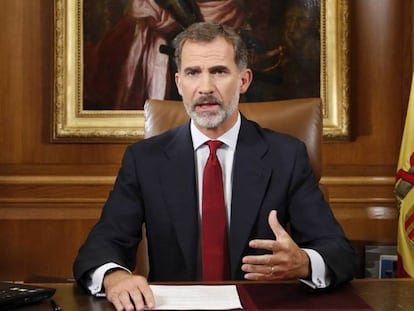A Catalan government that is anti-Catalan
Faced with an insurgency, a political proposal that will attract a majority of the region¡¯s population must urgently be crafted

Catalonia experienced another day of chaos on Tuesday. The mass mobilization combined elements of a secessionist strike with youthful protests over police action on Sunday ¨C with resulting scenes of intimidation, turmoil and chaos that perfectly illustrate the magnitude of the crisis currently gripping Spain.
The truly alarming thing about yesterday¡¯s events is that they evidenced the extent to which the Catalan government is acting like a committee of professional agitators, like an agent of insurgency, like an anti-institution: in short, like an apparatus that works against the liberal system, making the most of the advantages and privileges granted by the democratic institutions in order to consummate a serialized coup d¡¯¨¦tat.
It is cause for surprise, and embarrassment, that the Catalan chaos is going to be discussed in the European Parliament before it is addressed in Spain¡¯s own Congress
Regional premier Carles Puigdemont, his deputy Oriol Junqueras, and their entire governing team (including the rare few department heads who supposedly oppose their boss¡¯s plans, but who remain strictly silent about it in public) are responsible for the public disorder and the break with the law ¨C and they must be held responsible before the relevant political and judicial bodies. They called on citizens to vote in a ballot that lacked the necessary legal guarantees and entailed a personal safety risk. They organized the illegal event in partnership with civil associations (ANC, ?mnium) which they themselves funded, using clandestine techniques of urban geography control more typical of other parts of the world. Neither the use of force nor the praise which may come from some quarters can ever turn their irregular, fraudulent consultation into a valid referendum.
The Catalan government ¨C the Generalitat ¨C conspired with unions to call a general strike for the benefit of secessionist forces; it was a siren call that was fortunately avoided. The Generalitat has furthermore organized episodes of harassment against Spanish police officers to force them to leave Catalonia. The Generalitat has also organized a strike of its own government workers, concealed (they always need to use a mask) behind a deceitful description: ¡°general stoppage.¡± And with the aggravating factor that besides being mandatory, this strike comes for free, as it does not entail salary reductions. This is an evident instance of squandering (or embezzling) public funds.
For all of these reasons, the Catalan government is not acting, as it should, like a government of Catalonia: it is acting against the interests of all Catalans, against their physical and legal safety, against their freedom of movement, against the honest administration of their taxes, against their financial assets, and those of their banks and businesses. And if they persist, they will be acting against everyone¡¯s well-being and income ¨C whether high, middle or low ¨C of everyone, as their image continues to deteriorate in the eyes of the markets.
This is not, then, a government that works for Catalans, but against them.
This is about reinforcing the beliefs of a majority of Catalans who want to increase their prosperity and self-government within our common home that is Spain
Such is the dramatic depth of the situation, and there are just two ways to act. On one hand, to keep defending the law, using all legal means available, until constitutional and statutory order are fully restored: until the Catalan government stops acting like a picket line, the regional police stop acting like a group of butlers, and the supreme norms of democratic coexistence that were entrusted to the regional parliament are fully restored.
On the other hand, there is greater urgency than ever for the government and Spain¡¯s democratic forces, including moderate Basque nationalists, to forge a common response, a proposal, an offer for the Catalans, a project that they might be interested in and get excited about.
This in no way represents a strategy of appeasement of radical secessionists. That would be impossible, as there is little to discuss with those who say they are willing to talk, but only to talk about breaking, never about rebuilding, and who are disinclined to stray away from the criminal path they have embarked on.
On the contrary, this is about reinforcing the beliefs of a majority of Catalans who want to increase their own prosperity and self-government within our common home that is Spain. This is about welcoming back those who have thrown themselves into the arms of secessionists as the (tactical) lesser of two evils, given the deaf ears, passive attitude and lack of progress emanating from Madrid.
The truly alarming thing about Tuesday¡¯s events is they evidenced the extent to which the Catalan government is acting like a committee of professional agitators
It is cause for surprise, and embarrassment, that the Catalan chaos is going to be discussed in the European Parliament before it is addressed in Spain¡¯s own Congress. It would be worrisome if the leaders of the three Spanish parties most deeply committed to defending the constitutional order were unable to formulate common workable ideas ¨C not ideas to negotiate with those who don¡¯t want to negotiate anything other than details regarding their own breakaway process; we mean ideas to entice Catalan citizens with a powerful offer ¨C an offer that is generous, ambitious, attractive, incontestable, and which could later be negotiated, encoded in a pact and ratified ¨C how else? ¨C through a legal referendum with all due guarantees. Without any coups. In peace.
English version by Susana Urra.
Tu suscripci¨®n se est¨¢ usando en otro dispositivo
?Quieres a?adir otro usuario a tu suscripci¨®n?
Si contin¨²as leyendo en este dispositivo, no se podr¨¢ leer en el otro.
FlechaTu suscripci¨®n se est¨¢ usando en otro dispositivo y solo puedes acceder a EL PA?S desde un dispositivo a la vez.
Si quieres compartir tu cuenta, cambia tu suscripci¨®n a la modalidad Premium, as¨ª podr¨¢s a?adir otro usuario. Cada uno acceder¨¢ con su propia cuenta de email, lo que os permitir¨¢ personalizar vuestra experiencia en EL PA?S.
?Tienes una suscripci¨®n de empresa? Accede aqu¨ª para contratar m¨¢s cuentas.
En el caso de no saber qui¨¦n est¨¢ usando tu cuenta, te recomendamos cambiar tu contrase?a aqu¨ª.
Si decides continuar compartiendo tu cuenta, este mensaje se mostrar¨¢ en tu dispositivo y en el de la otra persona que est¨¢ usando tu cuenta de forma indefinida, afectando a tu experiencia de lectura. Puedes consultar aqu¨ª los t¨¦rminos y condiciones de la suscripci¨®n digital.










































